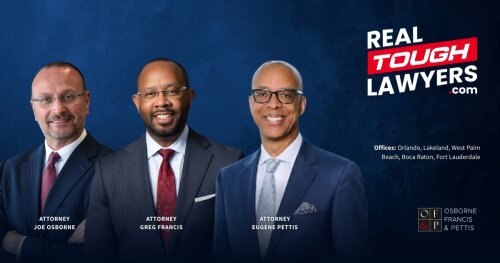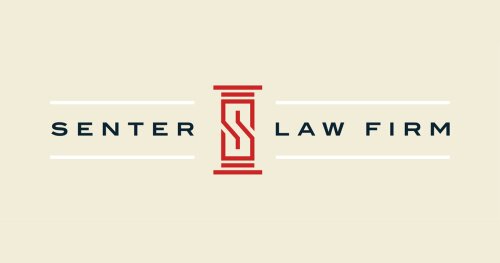Best Ethics and Professional Responsibility Lawyers in Florida
Share your needs with us, get contacted by law firms.
Free. Takes 2 min.
Or refine your search by selecting a city:
List of the best lawyers in Florida, United States
About Ethics and Professional Responsibility Law in Florida, United States
Ethics and Professional Responsibility law in Florida focuses on regulating and guiding the conduct of attorneys, judges, and legal professionals. It ensures that individuals working in the legal field adhere to strict standards of honesty, confidentiality, and diligence. The Florida Bar sets forth specific rules and codes of conduct that members of the legal profession must follow. These rules help maintain public trust in the legal system and protect the interests of clients and the wider community.
Why You May Need a Lawyer
There are several situations where seeking legal advice regarding Ethics and Professional Responsibility may be essential. If you are a lawyer facing allegations of misconduct, disbarment, or disciplinary action, an attorney specializing in this area can help protect your career. Clients who believe their attorney has acted unethically, such as breaching confidentiality or mishandling funds, may also need legal assistance to address grievances. Law firms, legal organizations, or individuals with questions about ethical boundaries during representation, potential conflicts of interest, or the proper management of trust accounts often turn to legal specialists in this field for guidance.
Local Laws Overview
Florida has its own set of rules governing attorney behavior, primarily under the Florida Rules of Professional Conduct, which the Florida Supreme Court oversees. These rules cover topics such as client-lawyer confidentiality, conflicts of interest, the duty of loyalty, proper handling of client funds, advertising, solicitation, and the unauthorized practice of law. The Florida Bar is responsible for investigating and prosecuting ethical violations. Cases of suspected misconduct are reviewed by the Bar’s grievance committees, and serious matters may lead to disciplinary proceedings before the Florida Supreme Court. Notably, Florida maintains a robust system for client complaints, mandatory continuing legal education on ethics, and supports attorneys seeking guidance through its Ethics Hotline.
Frequently Asked Questions
What is considered professional misconduct for lawyers in Florida?
Professional misconduct includes acts such as fraud, deceit, misrepresentation, conflict of interest, failure to communicate with clients, improper handling of client funds, and actions that violate the Florida Rules of Professional Conduct.
What happens if a lawyer violates ethics rules in Florida?
Alleged violations are investigated by the Florida Bar. Depending on the severity, consequences may include reprimand, suspension, disbarment, or other disciplinary actions.
Can clients file complaints against their attorneys?
Yes, clients have the right to report ethical concerns to the Florida Bar, which has a formal process for investigating complaints against attorneys.
What are some examples of conflicts of interest?
A conflict of interest arises when a lawyer’s duties to one client are compromised by duties to another client or by the lawyer’s personal interests. Typical examples include representing opposing parties in the same matter or having a financial stake in the client’s case.
Are lawyers required to keep client information confidential?
Yes, lawyers are obligated to maintain client confidentiality unless the client consents or the law requires disclosure, such as to prevent certain crimes.
What is the Florida Bar Ethics Hotline?
The Ethics Hotline is a confidential service provided by the Florida Bar that allows attorneys to seek guidance on ethical dilemmas and questions related to their professional responsibilities.
How does the Florida Bar handle complaints?
Complaints are reviewed by Bar counsel and may be referred to a grievance committee. If there is cause for concern, formal disciplinary proceedings may follow, potentially leading to hearings before the Florida Supreme Court.
What should I do if I think my lawyer acted unethically?
Consider contacting a legal ethics attorney for advice and file a complaint with the Florida Bar, providing detailed documentation of your concerns.
Do attorneys in Florida receive ethics training?
Yes, Florida attorneys are required to complete continuing legal education, including ethics training, to maintain their licenses.
Is there a statute of limitations for filing ethics complaints?
Generally, there is no strict statute of limitations, but it is best to file complaints as soon as possible to facilitate prompt investigation.
Additional Resources
- The Florida Bar, which offers resources on ethics rules, complaint procedures, and continuing legal education courses. - The Florida Supreme Court, which provides access to the Florida Rules of Professional Conduct and disciplinary case opinions. - The American Bar Association’s Center for Professional Responsibility, for broader guidance on ethical standards. - Local law libraries and legal aid organizations, where individuals can research ethics rules and seek advice.
Next Steps
If you need legal assistance with an Ethics and Professional Responsibility matter in Florida, start by gathering all relevant documents and details about the situation. Consider consulting with a legal ethics attorney who practices in Florida or reach out to the Florida Bar for procedural guidance. If you are an attorney with ethical concerns, use the Bar’s Ethics Hotline for confidential advice. Filing a complaint or responding to an investigation often involves strict timelines, so prompt action is advisable. Staying informed of your rights and responsibilities is key to navigating these sensitive matters effectively.
Lawzana helps you find the best lawyers and law firms in Florida through a curated and pre-screened list of qualified legal professionals. Our platform offers rankings and detailed profiles of attorneys and law firms, allowing you to compare based on practice areas, including Ethics and Professional Responsibility, experience, and client feedback.
Each profile includes a description of the firm's areas of practice, client reviews, team members and partners, year of establishment, spoken languages, office locations, contact information, social media presence, and any published articles or resources. Most firms on our platform speak English and are experienced in both local and international legal matters.
Get a quote from top-rated law firms in Florida, United States — quickly, securely, and without unnecessary hassle.
Disclaimer:
The information provided on this page is for general informational purposes only and does not constitute legal advice. While we strive to ensure the accuracy and relevance of the content, legal information may change over time, and interpretations of the law can vary. You should always consult with a qualified legal professional for advice specific to your situation.
We disclaim all liability for actions taken or not taken based on the content of this page. If you believe any information is incorrect or outdated, please contact us, and we will review and update it where appropriate.
Browse ethics and professional responsibility law firms by city in Florida
Refine your search by selecting a city.














